
Arendt and Heidegger
Arendt and Heidegger
THE FATE OF THE POLITICAL
 DANA R. VILLA
DANA R. VILLA
PRINCETON UNIVERSITY PRESS
PRINCETON, NEW JERSEY
Copyright 1996 by Princeton University Press
Published by Princeton University Press, 41 William Street, Princeton, New Jersey 08540
In the United Kingdom: Princeton University Press, Chichester, West Sussex
All Rights Reserved
Library of Congress Cataloging-in-Publication Data
Villa, Dana Richard.
Arendt and Heidegger : the fate of the political / Dana R. Villa.
p. cm.
Includes bibliographical references and index.
ISBN 0691044015 (CL : alk. paper).ISBN 0691044007 (pbk. : alk. paper)
1. Arendt, HannahContributions in political science.
2. Heidegger, Martin, 18891976Contributions in political science.
3. Political sciencePhilosophy. I. Title.
JC251.A74V55 1995.
320.0922dc20 9513293
This book has been composed in Goudy
Princeton University Press books are printed on acid-free paper and meet the guidelines for permanence and durability of the Committee on Production Guidelines for Book Longevity of the Council on Library Resources
Printed in the United States of America by Princeton Academic Press
1 3 5 7 9 10 8 6 4 2
1 3 5 7 9 10 8 6 4 2
(pbk)
 TO MY PARENTS
TO MY PARENTS
ALFRED VILLA AND
VIRGINIA BARRETT VILLA
 CONTENTS
CONTENTS
INTRODUCTION
The Problem of Action in Arendt | 3
3 |
CHAPTER 1
Arendt, Aristotle, and Action |
CHAPTER 2
Thinking Action against the Tradition |
CHAPTER 3
Arendt, Nietzsche, and the Aestheticization of Political Action |
CHAPTER 4
The Heideggerian Roots of Arendts Political Theory |
II. The Abyss of Freedom and Daseins Disclosedness: Thinking Freedom in Its Worldliness and Contingency |
CHAPTER 5
Groundless Action, Groundless Judgment: Politics after Metaphysics |
CHAPTER 6
The Critique of Modernity |
CHAPTER 7
Arendt, Heidegger, and the Oblivion of Praxis |
CHAPTER 8
Heidegger, Poisis, and Politics |
 PREFACE
PREFACE
THIS BOOK is about Hannah Arendts theory of political action and its relation, both positive and negative, to the philosophy of Martin Heidegger. As such, its focus is at once narrow and broad. Narrow because I do not attempt to provide a comprehensive overview and critique of Arendts political thought as a whole (readers anxious for such an overview would do well to consult George Katebs study or Margaret Canovans recent work). One unavoidable result of my focus on her theory of action is that important components of Arendts thought are given summary treatment. Thus, to take but one example, The Origins of Totalitarianism receives relatively modest attention in what follows, as does Eichmann in Jerusalem. The danger of such a selective approach, as Canovan points out, is an underemphasis on the very experiences that drove Arendt to theorize about politics in the first place. Nevertheless, I feel that a focus on the radical and untraditional elements of her theory of action offers us a new and needed perspective on one of the most original political thinkers of the twentieth century. Indeed, it is my contention that the extent of Hannah Arendts originality as a political thinker comes into view only through such sustained attention to her theory of political action and the way it breaks with the Western tradition of political thought.
The broadness of the project flows not simply from my using Heidegger to illuminate relatively neglected dimensions of Arendts work and Arendt to criticize Heideggers philosophical politics. To be sure, neither task is a small one. They are complicated, however, by the fact that so much of what is original in Arendt occurs as a critical response to our tradition of philosophy and political theory. Her theory of action performs what can only be called a depth critique of that tradition, right down to its Platonic-Aristotelian roots. She turns to Heideggers deconstruction of Western philosophy in order to uncover the origins of this traditions antipolitical prejudices. Arendt does not merely repeat Heideggers destructive gesture: she pushes his interpretive violence in a direction he would not (and apparently did not) recognize. Thus, what is investigated here is not merely the complex relation of Arendts political theory to Heideggers philosophy but, perhaps more compellingly, Arendts and Heideggers critique of the tradition and their assessment of its contribution to contemporary pathologies.
The and in my title, then, hides the three-sided character of the discussion, a discussion that proceeds by juxtaposing Arendt and Heidegger to the foundationalist, authoritarian tradition they both attack. Needless to say, the Arendt who emerges in this context is a thinker at some distance from our everyday political concerns. Unlike some recent commentators, I have not attempted to rethink Arendt in order to make her more available to current political movements. All too often such appropriative readings have wound up either domesticating her thought or rejecting its central thematic concerns. Thus, for example, the all-important Arendtian distinction between public and private is often rejected by those who are critical of this distinction as it has been framed by liberal political theory. However, to want to hold onto Arendts agonistic view of action while rejecting (or even failing to recognize) her concern for the peculiar reality of the public sphere is to leave Arendt behind. It is to make her guilty of holding our prejudices about how and why the line between public and private should be drawn, and then to chastise her for our projection. If one wants to criticize Arendts public/private distinction, one should at least admit that it is not the same as that found in liberal theory, and that the motive behind itnamely, reminding us of the characteristics of a distinct yet historically variable phenomenological realmhas little to do with, say, Lockes demarcation of the boundaries of legitimate state power.
Reading Arendt with and against Heidegger is important, because it helps us to make sense of her fears about the dissipation of the public realm, a realm distinct from both the state and the economy. It also helps us to unravel the mystery of why she wanted to think of politics as a relatively pure, self-contained activity. Her fears and her response are thoughts out of season at a time when the blurring of boundaries is celebrated as the all-purpose cure for the deformations of the modern age.
Arendts political theory, then, is important not solely for the resources it provides to current struggles (for greater equality, participation, and a healthier deliberative democracy). Its deeper value resides in the radically new perspective she offers on the
Next page
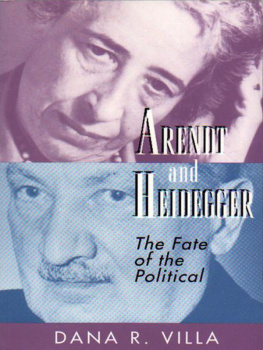



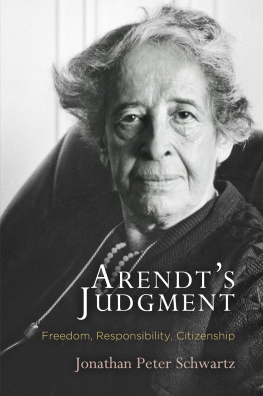
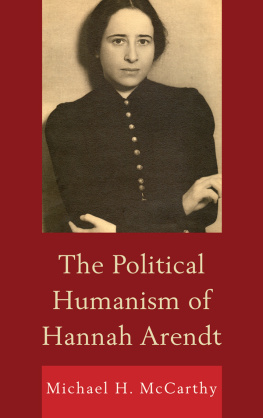
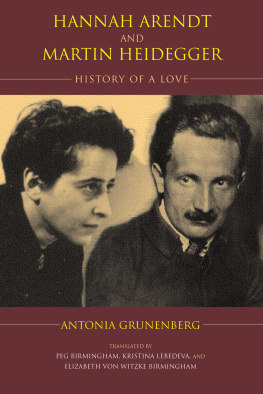
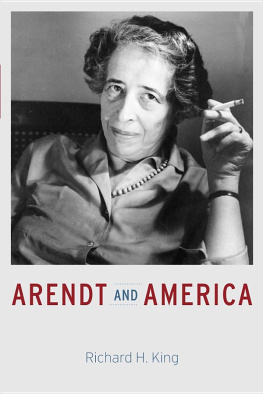

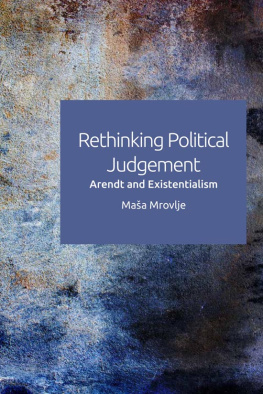
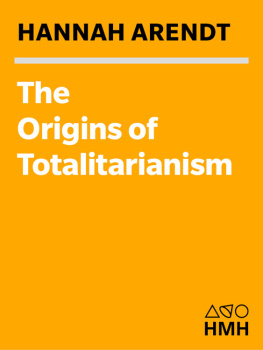
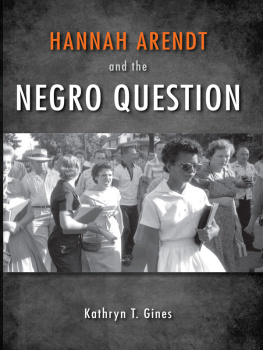


 DANA R. VILLA
DANA R. VILLA